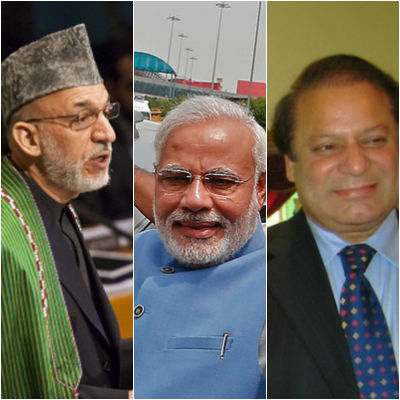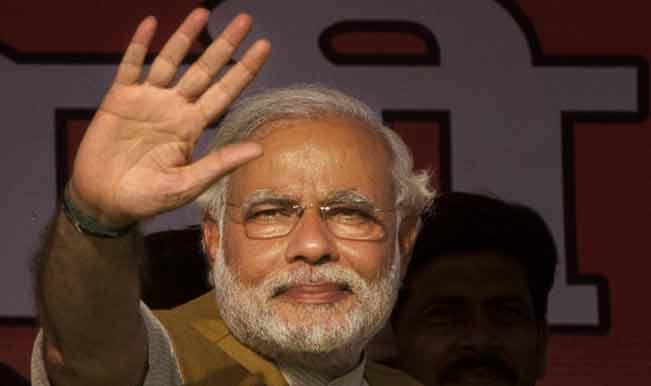Normalized relations with Pakistan will add
1% to India's growth rate, and Modi is all about economic growth. But that normalization is no easy task since Pakistan is not exactly a
democracy. So one has to be careful. One has to be realistic. One can not close the doors of engagement, but one also has to be tough.
The latest salvo from Nawaz Sharif is that there can be no peace talks unless India is willing to talk about Kashmir. That is posturing. He needs to do that to stay credible inside Pakistan. He can not act too eager for peace and still stay viable inside Pakistani politics. Just like Modi had to act tough for a year. He needed to do that. To send a clear message to Pakistan that he means business, but also to send a message to the home audience, that he is tough with Pakistan.
Peace with Pakistan is hard because Pakistan is not a democracy. The army is not subservient to the Pakistani parliament. The ISI is a three headed hydra. Only one of the heads might be answerable to the parliament. The hardliners inside the ISI and the army need to keep the conflict going. If there is peace, they become irrelevant. And so they seek for opportunities to stoke the fire. When peace attempts are made, they feel the need to scuttle the efforts. Nawaz, frankly, does not have the power to make peace. He can not give you what he does not have.
Any genuine peace effort from India's side has to be multi-dimensional. When Modi meets and talk to Nawaz, high ranked army people on both sides also should meet and talk. The army people should try to set up things like hotlines. Both are nuclear powers after all. Seeking to establish hotlines might be one way to stoke Pakistan's nuclear ego.
Another place where Nawaz is powerless is Pakistan truly has a major domestic terrorism problem. The Pakistani people are at the receiving end of it, the Pakistani army is, the Pakistani establishment is. And it does not help that some elements of both the ISI and the army nurture, aid and abet some or many of those same terrorists. Nawaz could not halt domestic terrorism inside Pakistan even if he wanted to, and he is trying his best, or as much as his limited powers allow. Pakistan can not help India with something it can not help itself with.
There is no state that America can expect will take care of either the ISIS or the Al Qaeda. These are not state actors. And they have to be dealt with directly. Similarly, India has to do the best it can to stay one step ahead of the various terror outfits. You try to prevent attacks, you nab them when you can, you try to infiltrate them, you hit back when you can, you cooperate with powers like America on things like intelligence sharing. Pakistan can not help you with something that it can not help itself with.
Having said that, it is an open secret that the inferior Pakistani army relies on terror groups to make its point when it feels the need. You can not ignore that.
Peace with Pakistan is not like Reagan meeting Gorbachev. Nawaz has parallel power centers all around him, several of whom don't think of him as their superior or boss. India has to move ahead with that knowledge.
- Moving from a position of strength is key. There are elements on the Pakistani side, many of them not in Nawaz' control, that simply do not talk the language of reason.
- Not engaging is not an option.
- A multi-pronged approach to peace talks is key. The parallel power centers will only respond to direct engagement, and even then they will play hard to get. Think about it. Why will they negotiate away their central place in Pakistani society?
- Because there is no immediate solution to terrorism, one has to keep expectations low. Peace with Pakistan will be a slow process. Larger tectonic forces are at play. Think of it as Climate Change. It is complex, and Nawaz can not help you. So suggesting he does not want to is a lame excuse. Maybe so. Maybe he does not want to help. But he can't even if he wants to.
In the short term I am pessimistic about the prospects. Larger global forces are at play. And those forces will have to align in a certain way for India and Pakistan to see genuine peace. Scapegoating Kashmir is one way to go about it. But it really is about the terrorists. Kashmir is not why they exist. And Modi-Nawaz handshakes will not make them go away.
A sophisticated engagement where you are plain realistic is perhaps the way to go. Keep expectations low, but stay engaged at multiple levels. And seek small areas of cooperation like, hotlines between the two armies, perhaps even information sharing on terrorists, and there the US might have a role.
Like Yaser Arafat said about Israelis, "We are practically cousins!"
India succeeding to make peace with Pakistan is about if Pakistan can become a full democracy where the army and the ISI come completely under the Pakistani parliament, and if the world makes progress with dealing with terrorism, whose only solution I think is a total spread of democracy across the Muslims world, where, ironically, both India and Pakistan are in a very good position to play a decisive role.
Maybe that higher purpose will bring Modi and Nawaz closer together.
Curiously India has excellent relations with Afghanistan, Iran and several other states in the region.
Does it help to realize that the partition was Britain's fault? No?





















![Reblog this post [with Zemanta]](http://img.zemanta.com/reblog_e.png?x-id=02fb0959-31e7-43f9-9e41-c09272e51ab2)